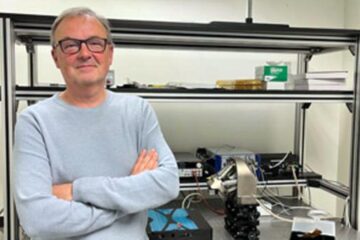Huge ocean 'Frisbees' spin off Brazil's coast

As the North Brazil Current (NBC) moves northward along the northeastern coast of Brazil, it draws water from the South Equatorial Current and the freshwater outflow from the Amazon River, providing a source for warm, nutrient-rich water.
Just northwest of Brazil, part of the NBC banks a hard right and flows east along the equator. Occasionally, the turn is especially sharp and the current loops around, pinching off an independently- traveling parcel of warm water. This portion travels northwest with a clockwise rotation, moving through the ocean like a Frisbee™ travels through air.
These current rings have been known to exist for decades, but knowledge of their basic properties such as size, speed, depth, and rotation velocity has been limited. Drawing on current profiles from both shipboard and stationary instruments, University of Miami researchers Guilherme Castelão and Bill Johns describe the basic properties of ten rings sampled between 1998 and 2000. The authors find that the rings are best described as solid, clockwise-rotating parcels of water enclosed within a band of lower-speed water that tends to protect them from the surrounding environment.
Overall, this research has established that the NBC rings seem to be bigger, faster, and taller than previous observations suggested.
The study, titled “Sea surface structure of North Brazil Current rings derived from shipboard and moored acoustic Doppler current profiler observations” appears in the Journal of Geophysical Research – Oceans, a publication of the American Geophysical Union.
About the University of Miami's Rosenstiel School
The University of Miami's mission is to educate and nurture students, to create knowledge, and to provide service to our community and beyond. Committed to excellence and proud of the diversity of our University family, we strive to develop future leaders of our nation and the world. Founded in the 1940's, the Rosenstiel School of Marine & Atmospheric Science has grown into one of the world's premier marine and atmospheric research institutions. Offering dynamic interdisciplinary academics, the Rosenstiel School is dedicated to helping communities to better understand the planet, participating in the establishment of environmental policies, and aiding in the improvement of society and quality of life. For more information, please visit www.rsmas.miami.edu.
Media Contact
More Information:
http://www.rsmas.miami.eduAll latest news from the category: Earth Sciences
Earth Sciences (also referred to as Geosciences), which deals with basic issues surrounding our planet, plays a vital role in the area of energy and raw materials supply.
Earth Sciences comprises subjects such as geology, geography, geological informatics, paleontology, mineralogy, petrography, crystallography, geophysics, geodesy, glaciology, cartography, photogrammetry, meteorology and seismology, early-warning systems, earthquake research and polar research.
Newest articles

Stretchable quantum dot display
Intrinsically stretchable quantum dot-based light-emitting diodes achieved record-breaking performance. A team of South Korean scientists led by Professor KIM Dae-Hyeong of the Center for Nanoparticle Research within the Institute for…

Internet can achieve quantum speed with light saved as sound
Researchers at the University of Copenhagen’s Niels Bohr Institute have developed a new way to create quantum memory: A small drum can store data sent with light in its sonic…

A chip unique in the world
A team from UPV and iPRONICS has manufactured the first universal, programmable and multifunctional photonic chip on the market. A team from the Photonics Research Laboratory (PRL)-iTEAM of the Universitat…




















